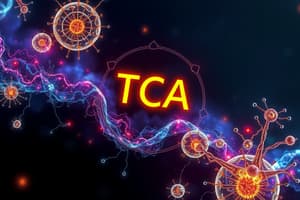Podcast
Questions and Answers
When triggered, which part of the brain takes over in fight, flight, or freeze mode?
When triggered, which part of the brain takes over in fight, flight, or freeze mode?
- The rational and intellectual part of the brain
- The amygdala (correct)
- The hippocampus
- The prefrontal cortex
What is the benefit of having a binder or cue cards with DBT skills in triggering situations?
What is the benefit of having a binder or cue cards with DBT skills in triggering situations?
- They can make the situation more triggering
- They can help engage the rational mind, be effective, and self-soothe (correct)
- They can make the situation less triggering
- They can replace the amygdala's response with the rational mind's response
What is the goal of using DBT skills in triggering situations?
What is the goal of using DBT skills in triggering situations?
- To cope and deal effectively and skillfully (correct)
- To react quickly and impulsively
- To avoid the situation entirely
- To make the situation more triggering
What is coping ahead?
What is coping ahead?
What happens to neuro pathways in the brain as a result of repetition?
What happens to neuro pathways in the brain as a result of repetition?
What is the benefit of taking a moment to pause and regroup when triggered?
What is the benefit of taking a moment to pause and regroup when triggered?
What is the result of practicing DBT skills with repetition?
What is the result of practicing DBT skills with repetition?
What is the role of cue cards with DBT skills in triggering situations?
What is the role of cue cards with DBT skills in triggering situations?
What happens to the rational and intellectual part of the brain when triggered?
What happens to the rational and intellectual part of the brain when triggered?
What is the benefit of being aware of triggers and signs of being in fight, flight, or freeze mode?
What is the benefit of being aware of triggers and signs of being in fight, flight, or freeze mode?
What is the role of coping ahead in managing triggers?
What is the role of coping ahead in managing triggers?
What is the role of repetition in practicing DBT skills?
What is the role of repetition in practicing DBT skills?
When triggered, which part of the brain takes over in fight, flight, or freeze mode?
When triggered, which part of the brain takes over in fight, flight, or freeze mode?
What is the benefit of having a binder or cue cards with DBT skills in triggering situations?
What is the benefit of having a binder or cue cards with DBT skills in triggering situations?
What is the goal of using DBT skills in triggering situations?
What is the goal of using DBT skills in triggering situations?
What is coping ahead?
What is coping ahead?
What happens to neuro pathways in the brain as a result of repetition?
What happens to neuro pathways in the brain as a result of repetition?
What is the benefit of taking a moment to pause and regroup when triggered?
What is the benefit of taking a moment to pause and regroup when triggered?
What is the result of practicing DBT skills with repetition?
What is the result of practicing DBT skills with repetition?
What is the role of cue cards with DBT skills in triggering situations?
What is the role of cue cards with DBT skills in triggering situations?
What happens to the rational and intellectual part of the brain when triggered?
What happens to the rational and intellectual part of the brain when triggered?
What is the benefit of being aware of triggers and signs of being in fight, flight, or freeze mode?
What is the benefit of being aware of triggers and signs of being in fight, flight, or freeze mode?
What is the role of coping ahead in managing triggers?
What is the role of coping ahead in managing triggers?
What is the role of repetition in practicing DBT skills?
What is the role of repetition in practicing DBT skills?
What are neuro pathways in the brain?
What are neuro pathways in the brain?
What happens to the rational and intellectual part of the brain when triggered?
What happens to the rational and intellectual part of the brain when triggered?
What can be helpful in triggering situations?
What can be helpful in triggering situations?
What can be used to engage the rational mind in triggering situations?
What can be used to engage the rational mind in triggering situations?
What is coping ahead?
What is coping ahead?
What is the goal of using DBT skills in triggering situations?
What is the goal of using DBT skills in triggering situations?
What happens when the nervous system is relaxed after being triggered?
What happens when the nervous system is relaxed after being triggered?
What is the amygdala?
What is the amygdala?
What is the first step in managing triggers using DBT skills?
What is the first step in managing triggers using DBT skills?
What can repetition do for DBT skills?
What can repetition do for DBT skills?
What is the benefit of having a binder or cue cards with DBT skills in triggering situations?
What is the benefit of having a binder or cue cards with DBT skills in triggering situations?
What is the result of years of repetition on neuro pathways in the brain?
What is the result of years of repetition on neuro pathways in the brain?
Flashcards are hidden until you start studying
Study Notes
Using DBT Skills to Manage Triggers and React Skillfully
- Neuro pathways in the brain are paved from years of repetition, resulting in quick, automatic responses to triggers.
- DBT skills may feel difficult to access and practice at first, but with repetition, they can become the more natural way of responding.
- When triggered, the rational and intellectual part of the brain shuts down, and the amygdala takes over in fight, flight, or freeze mode.
- It is helpful to be aware of triggers and signs of being in fight, flight, or freeze mode, and to take a moment to pause and regroup.
- A binder or cue cards with DBT skills can be helpful to engage the rational mind, be effective, and self-soothe in triggering situations.
- Coping ahead involves imagining oneself being successful in a triggering situation and repeatedly reading a script until it feels like second nature.
- The pause between being triggered and taking action gives the opportunity to choose a skillful response and return to the situation when the nervous system is relaxed.
- The goal is to cope and deal effectively and skillfully in triggering situations.
Studying That Suits You
Use AI to generate personalized quizzes and flashcards to suit your learning preferences.




